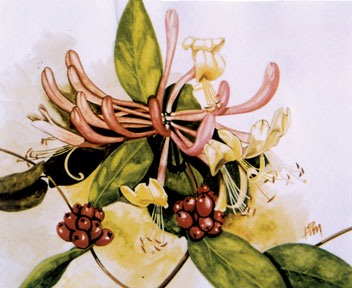Herbs mentioned by Shakespeare in his plays
by Gwen Herat
Recently week I wrote about the flowers that Shakespeare put into his
plays and today it is the herbs that he has mentioned, though briefly.
It is very interesting to study the aspects of his adoration for nature
and her splendour, the seasons, the birds and bees, trees and plants,
environment etc. that are found in his plays and sonnets. He has made
them all come out alive and keep us mindful of God's own creations for
mankind without which we cannot survive. But Shakespeare was no
botantist or for that matter, a horticulturist but rather a countryman
gifted with an acute sense of observation. In his matchless gift of
poetry, he sings their praise. Shakespeare was familiar with all the
wild and cultivated flowers, herbs, plants, etc. He excelled in his
exquisite expression of love for nature and her magic. No play went
unsung of their glories.
 |
|
Shakespeare celebrates the humble
woodbine in A Midsummer's Night's Dream as well as in Much
Ado About Nothing |
Both Shakespeare's parents came from farming families which made a
clear impression of his early environment, the instinct countryman that
he was, his native Warwickshire reflects throughout his works. His
birthplace, Stratford-upon-Avon which was a little market town linked
with the surrounding countryside situated in the very heart of England.
The River Avon alongside which the town had originated centuries before
as a river-crossing settlement, divided Arden woodlands country to the
north which still remain as an ancient forest with open fields and
pastures. Naturally, the young Shakespeare would have been absolutely
familiar with this setting where he grew up. Though he sought London to
make a name for himself, his heart lay in his native land. It was in
Welcombe on rising ground looking across the river valley over which he
wandered often that nature beckoned him. Apparently, he had observed the
colour, form, scent, etc. in plant life whether they were flowers or
fruit and even herbs that he had often seen in his mother's kitchen yard
and when she prepared his meals, he savoured the aroma in the food.
Shakespeare found the most common flowers interesting whether they
grew in the meadows, woods or hedge grow alongside with the spicy herbs
that at times were medicinal. the lush freshness of the Avon meadows and
the wooded landscapes of Arden forest in the backyard of his several
homes where some herbs were found, never escaped his observing eyes.
Herbs were often used in the preparation of food in the countryside and
often came from their gardens rather than from the markets. He knew and
understood the properties of herbs and the purposes for which they were
employed. The pale yellow woodbine now referred to as honeysuckle too
are mentioned. The name woodbine denotes its climbing character while
honeysuckle suggests the sweet juice of the flower and its juicy red
fruits that found its way to the kitchen.
Honeysuckle "And bid her steal into the
pleached bower
Where honeysuckle ripened by the sun
Forbid the sun to enter'
Much Ado About Nothing, III, I.
Balm (balsam) Melissa officinalis
"As sweet as balm, as soft as air, as gentle
..
Antony and Cleaopatra, V.II
Camomile - Anthemis noblis
"Though the camomile, though it is trodden
on the faster
it grows, yet youth, the more it is wasted
the sooner it wears ...
King Henry, IV (Part 1) 11, 1V
Fennel - Foeniculum vigare
'Ther's fennel for you and columbines ...
Hamlet, 1V, V
Garlic - Allium
'And most dear actors, eat no onions nor
garlic, for we are to utter sweet breath ...
A Midsummer Night's Dream, 1V, 11
Hyssop - Hyssopus officinalis
'We will plant nettles or sow lettuce
set hyssop and weed up thyme ...
Othello, 1, 111
Lavander - Lavandula spica
Mints - Mentha spicta
Savory - Satureia mentana
Marjoram - Organum vulgar
'Here's flowers for you
Hot lavander, mints, savory, marjoram
The Winter's Tale, 1V, 1V
Parseley - Carum petroselium
'I knew a wench married in an afternoon as
she went to the
garden for parsley to stuff a rabit ..
The Taming of the Shrew, 1V, 1V
Rosemary - Rosemarinus officinalis
'There's rosemary, that's for remembrance
pray you oove, remember ..
Hamlet, 1V. V
Rue - Ruta graveoleus
'Here she did fall a tear, here, in this
place
I'll set a bank of rue, sour herb of grace
Rue, even for ruth, here shortly shall be
seen
In the remembrance of a weeping queen ...
King Richard, 11. 111,1V
Saffron - Crocus sativus
'I must have saffron to colour the warden
pies ...
the Winter's Tale, 1V,111
Thyme - Thymus serpyllum
'I know a bank where the wild thyme blows
...
A Midsummer Night's Dream, 11, 1 |

